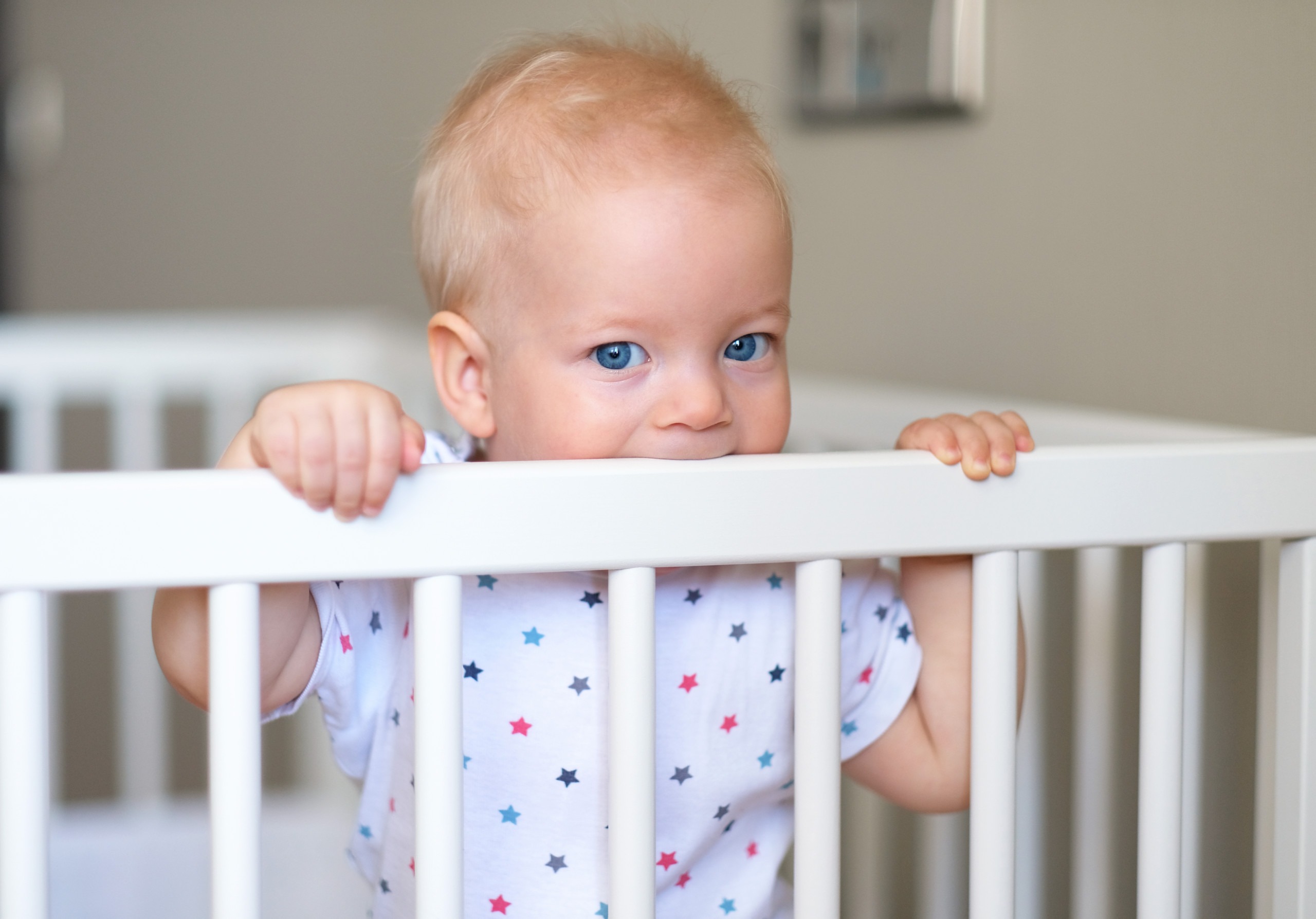Sleepless Night: Dealing with a Baby Sits Up in Crib at Night And Cries in the Crib
If your baby is sitting up in their crib and crying, there are a few things you can do to help. First, try to determine why they are crying. If they are hungry or need a diaper change, attend to their needs right away.
If they seem to be crying for no reason, try rocking them or singing to them until they calm down. You can also try giving them a pacifier or toy to hold onto.
If your baby suddenly sits up in their crib at night and cries, it can be a sign that they are experiencing some discomfort. It’s important to take a moment to check on your baby and see if there is anything that might be causing them distress. Sometimes, a simple change in position can help soothe your baby back to sleep.
However, if your baby continues to cry and seems inconsolable, it’s best to consult with your pediatrician to rule out any underlying health issues.
My Baby Stands Up in His Crib & Will Not Sleep – What Do I Do?
Baby Sits Up While Sleeping
If you have a baby, you may have noticed that they sometimes sit up while sleeping. This is actually quite common and is nothing to worry about. There are a few reasons why babies do this.
One reason is that babies have very weak muscles and their heads are heavy. When they fall asleep, their heads can droop forward and cause them to sit up. Another reason is that babies startle easily and sitting up can help them feel more secure.
Whatever the reason, there is no need to worry if your baby sits up while sleeping. They will eventually learn to sleep in other positions and it will not affect their health in any way.
Baby Sitting Up in Crib Middle of Night
If you’re a parent, you know the drill. You put your baby to bed, and then a few hours later you hear rustling from the crib. You peek in and see your little one sitting up, wide awake, and ready to start their night all over again!
It can be frustrating, especially if you were just getting ready for bed yourself. But don’t worry, you’re not alone. Lots of babies sit up in their cribs in the middle of the night.
There are a few things that could be causing this behavior. Maybe your baby is overtired, and their body is just trying to stay awake longer. Or maybe they need to use the restroom or are feeling uncomfortable in some way.
Whatever the reason, there are a few things you can do to help your baby (and yourself!) get through the night:
- Try rocking or patting them back to sleep instead of picking them up out of the crib. This will help them learn how to self-soothe and get back to sleep on their own.
- If they seem like they need to use the restroom, take them into the bathroom but don’t turn on any lights or make any noise. Help them go quickly so they don’t wake themselves up more than necessary.
Baby Keeps Sitting Up in Crib And Crying
If your baby keeps sitting up in their crib and crying, it could be a sign that they are not feeling well. It could also be a sign that they are overtired or uncomfortable. Try to comfort your baby and see if they will settle down.
If your baby continues to cry, you may want to consult with their doctor.
Baby Sitting Up Sleep Regression
If your baby has recently started sitting up on their own, you may have noticed a change in their sleep habits. This is called the “sitting up and sleeping regression,” and it’s a normal part of development for many babies. Here’s what you need to know about this phase and how to help your little one through it.
What is the sitting up and sleeping regression?
The sitting up sleep regression is a period of time (usually around 4-6 months) when your baby starts to sit up on their own but doesn’t yet have the muscles to support themselves for long periods of time. This can lead to a number of sleep issues, including:
Waking up more often during the night Taking shorter naps or skipping naps altogether Being cranky or fussy during the day
How long does it last?
The good news is that this phase doesn’t last forever! Most babies will outgrow it within a few weeks as they continue to develop their muscles.
In the meantime, there are some things you can do to help your little one through it.

Credit: sleepingwellconsulting.com
What to Do When Baby Sits Up in Crib And Cries?
If your baby is sitting up in their crib and crying, there are a few things you can do to help them. First, try to figure out why they’re crying. If they’re hungry or wet, you can obviously take care of those needs.
But if they seem to be crying for no reason, try rocking them or singing to them. You can also try picking them up and holding them close. Sometimes babies just need some extra attention and comforting.
If nothing seems to be working, it’s okay to let them cry for a little while. They’ll eventually tire themselves out and fall asleep on their own.
What to Do When Baby Keeps Sitting Up in Crib?
If your baby keeps sitting up in their crib, there are a few things you can do to encourage them to stay lying down.
- Try using a sleep positioner or wedge to prop your baby up at an angle and prevent them from being able to sit all the way up.
- Make sure the crib mattress is firm, so it doesn’t sink down too much when your baby leans or sits on it. A softer mattress may make it more tempting for your little one to sit up.
- Gently lay your baby back down each time they start to sit up, and provide reassuring words and touch. With patience and consistency, most babies will learn that lying down is how they should sleep in their cribs.
Why Does My Baby Keep Sitting Up at Night?
If your baby is sitting up at night, it’s likely because they’re uncomfortable and trying to find a position that feels good. There are a few things that could be causing this discomfort, so it’s important to talk to your child’s doctor to rule out any serious problems.
It’s common for babies to have gas and tummy trouble, which can make them sit up at night.
If you think this might be the case, try burping your baby more often during feedings and after they eat. You can also try giving them a gentle massage or holding them upright for a while after eating.
Another possibility is that your baby is teething.
This can cause pain and irritation in the gums, which may lead them to sit up at night. If you suspect this is the problem, offer your child something cold to chew on (like a frozen washcloth) or give them teething toys designed specifically for relieving gum pain.
Finally, it’s possible that your baby is simply restless and doesn’t want to sleep lying down.
In this case, there’s not much you can do other than wait it out – eventually they’ll get tired enough to lie down and sleep through the night.
Is It Ok for Baby to Sleep Sitting Up in Crib?
Most parents have a go-to method for getting their baby to sleep through the night. But what happens when that method stops working?
Many parents find themselves wondering if it’s okay for their baby to sleep sitting up in crib.
The answer is yes, it is perfectly safe for your baby to sleep sitting up in crib. In fact, this position can help reduce the risk of Sudden Infant Death Syndrome (SIDS). When babies are placed on their backs to sleep, they can sometimes roll onto their stomachs.
This can cause them to re-breathe carbon dioxide, which increases the risk of SIDS. Sleeping in an upright position prevents this from happening. There are a few things you should keep in mind if you’re going to allow your baby to sleep sitting up in crib.
First, make sure that the crib is sturdy and won’t tip over if your baby moves around.
Second, use a firm mattress so that your baby doesn’t sink down into the bedding and become trapped.
Finally, don’t use pillows or other soft objects in the crib because they could block your baby’s airway if he or she falls asleep face-down on them.
If you’re not comfortable with letting your baby sleep sitting up in crib, there are other options available. You could prop up one end of the crib with a pillow or rolled towel so that your baby is slightly elevated while sleeping on his or her back.
Conclusion
At night, baby sits up in her crib and cries. She may be hungry or thirsty, or she may just need some attention. Whatever the reason, it’s important to comfort your baby and help her get back to sleep.

